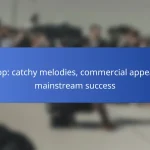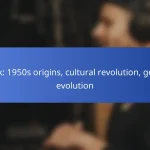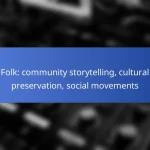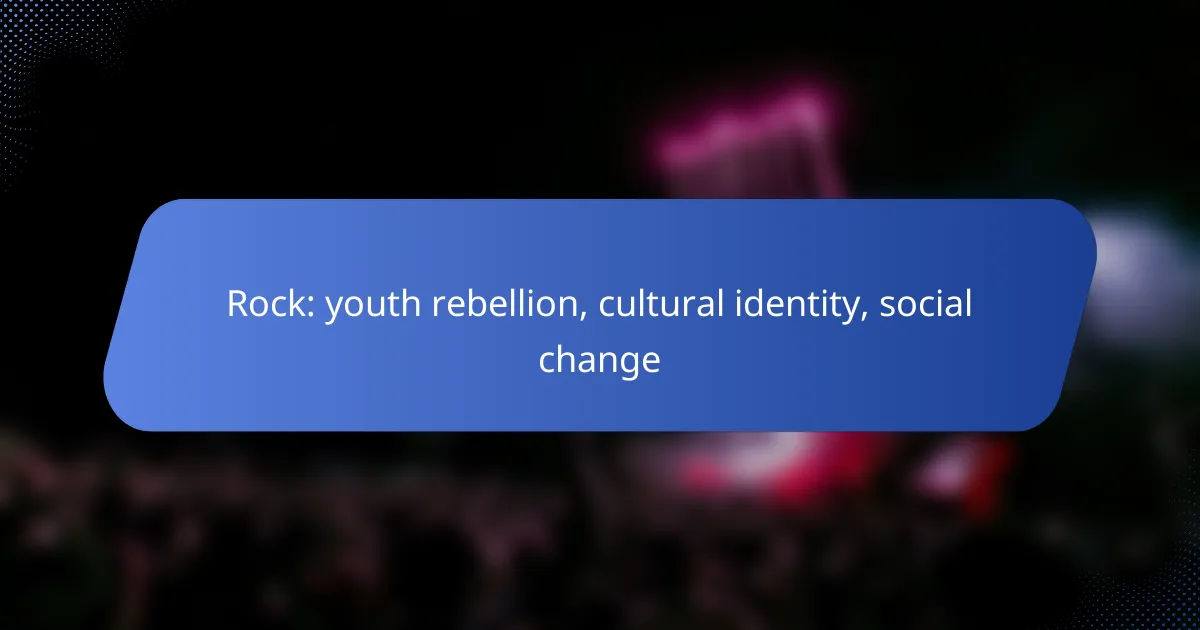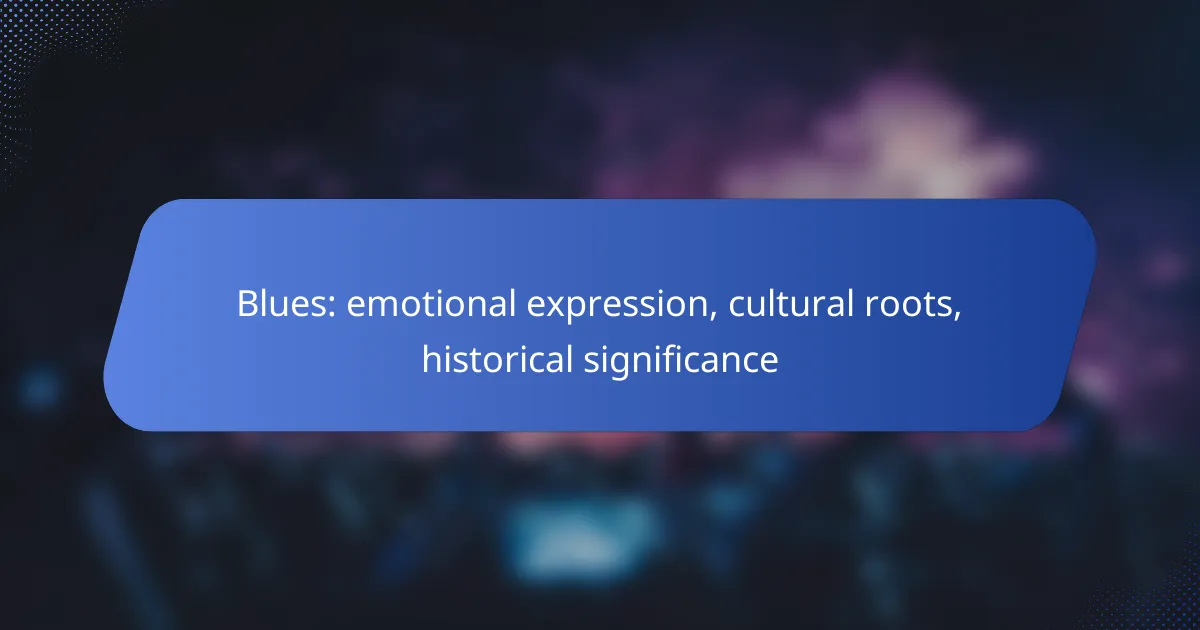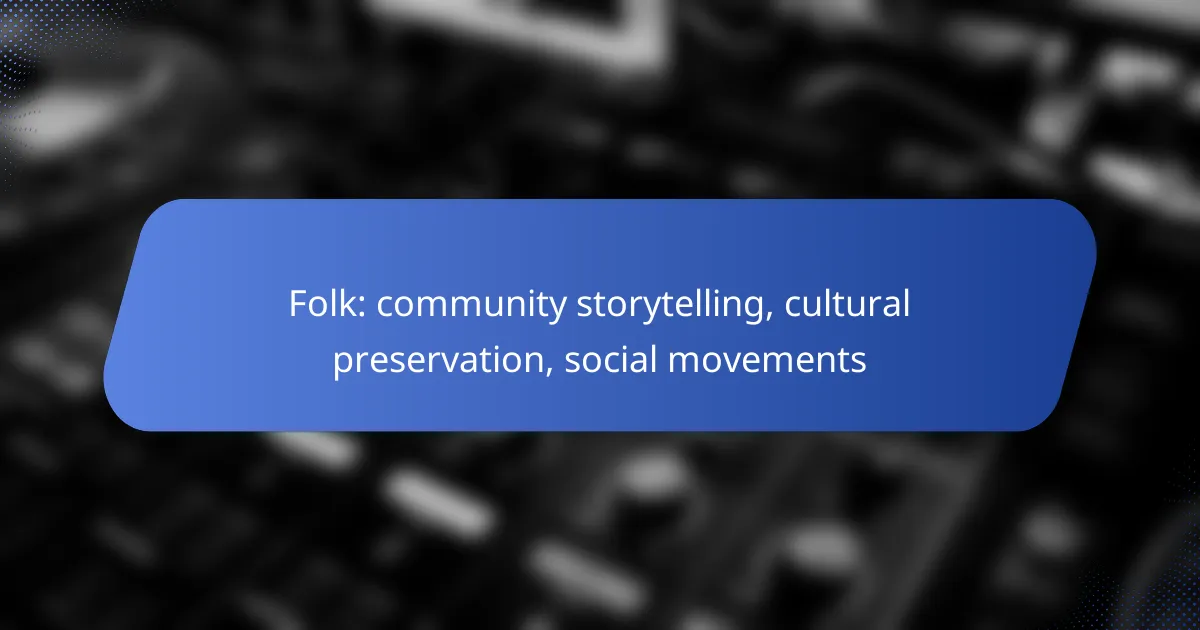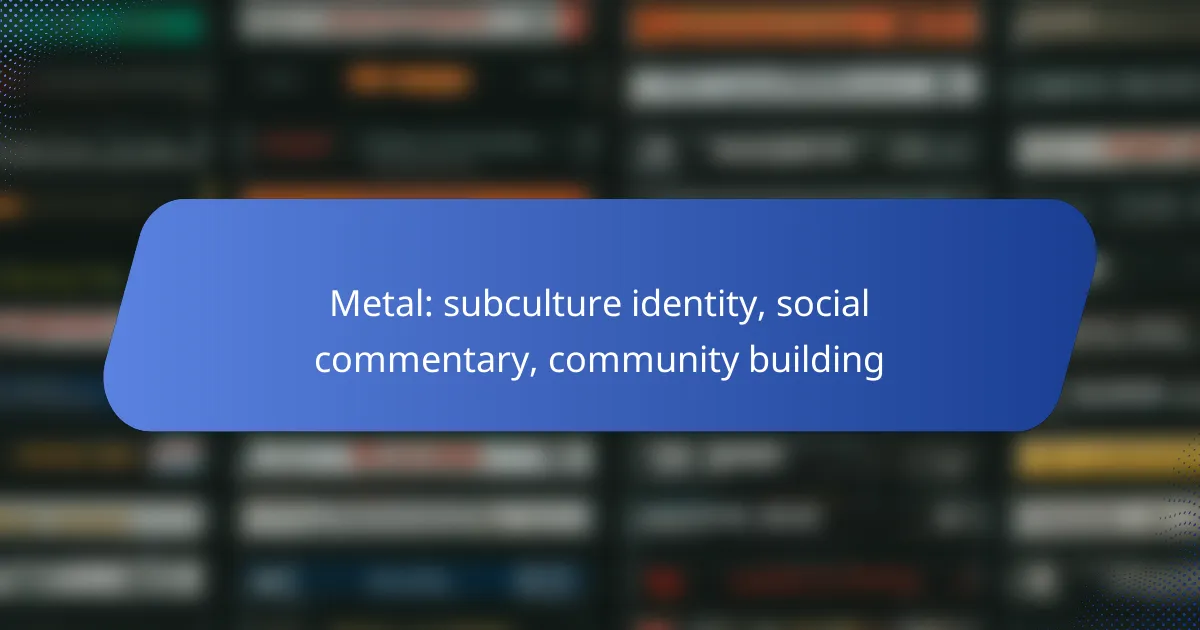Rock music has long been a catalyst for youth rebellion, offering a dynamic platform for self-expression and challenging societal norms. Its raw energy and provocative lyrics empower young people to assert their cultural identity while reflecting the social dynamics of their time. As a powerful vehicle for change, rock music amplifies voices advocating for social issues, inspiring movements and promoting awareness on critical topics.
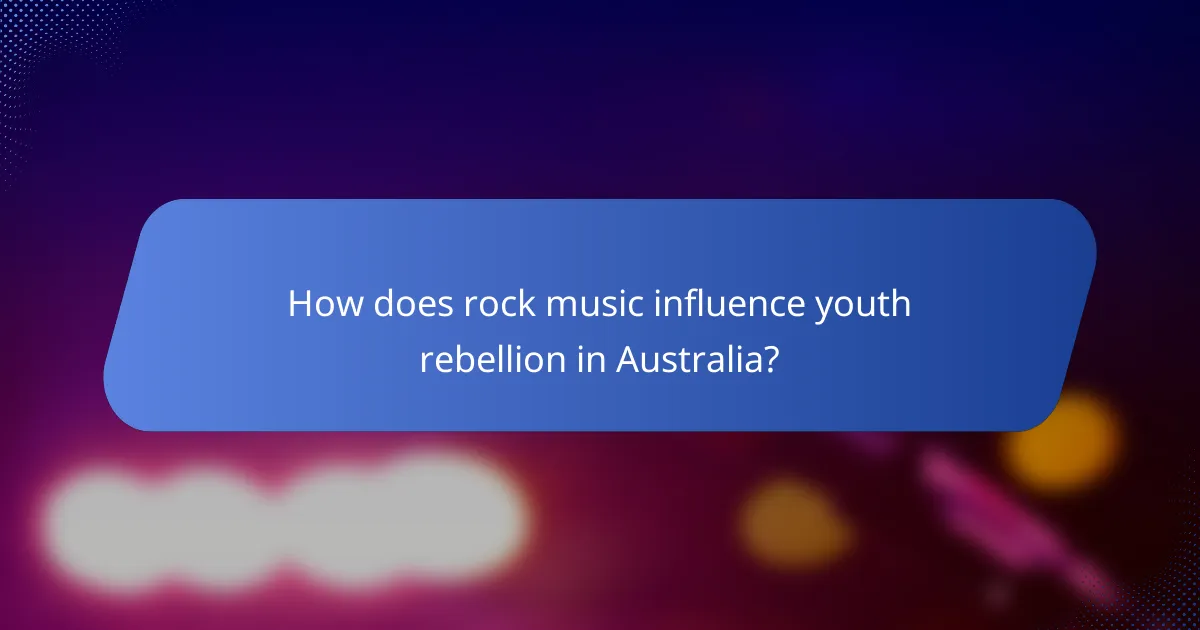
How does rock music influence youth rebellion in Australia?
Rock music significantly influences youth rebellion in Australia by providing a powerful medium for self-expression and a platform to challenge societal norms. Through its raw energy and often provocative lyrics, rock empowers young people to voice their discontent and assert their cultural identity.
Expression of individuality
Rock music serves as a vital outlet for young Australians to express their individuality. Artists often embrace unique styles and messages that resonate with the personal experiences of their listeners, encouraging them to celebrate their differences. This emphasis on personal identity fosters a sense of belonging among youth who may feel marginalized.
For instance, local bands like The Living End and Tame Impala have cultivated distinct sounds that reflect diverse Australian experiences, inspiring fans to embrace their own identities through fashion, attitude, and lifestyle choices.
Challenging societal norms
Rock music challenges societal norms by addressing controversial topics such as politics, inequality, and personal freedom. Lyrics often confront issues like government policies or social injustices, prompting young people to question the status quo. This rebellious spirit encourages youth to engage in activism and social movements.
In Australia, songs that critique environmental policies or advocate for Indigenous rights have sparked conversations among young listeners, motivating them to take action and demand change in their communities.
Historical context of Australian rock
The history of Australian rock is deeply intertwined with youth culture and rebellion. Emerging in the 1960s, bands like The Easybeats and later AC/DC and Midnight Oil captured the spirit of a generation seeking to break free from traditional constraints. Their music reflected the changing social landscape and resonated with the aspirations of young Australians.
As rock evolved, it continued to influence youth movements, with genres like punk and grunge emerging in the 1970s and 1990s, respectively. These movements not only shaped musical trends but also became synonymous with youth defiance and cultural identity in Australia.
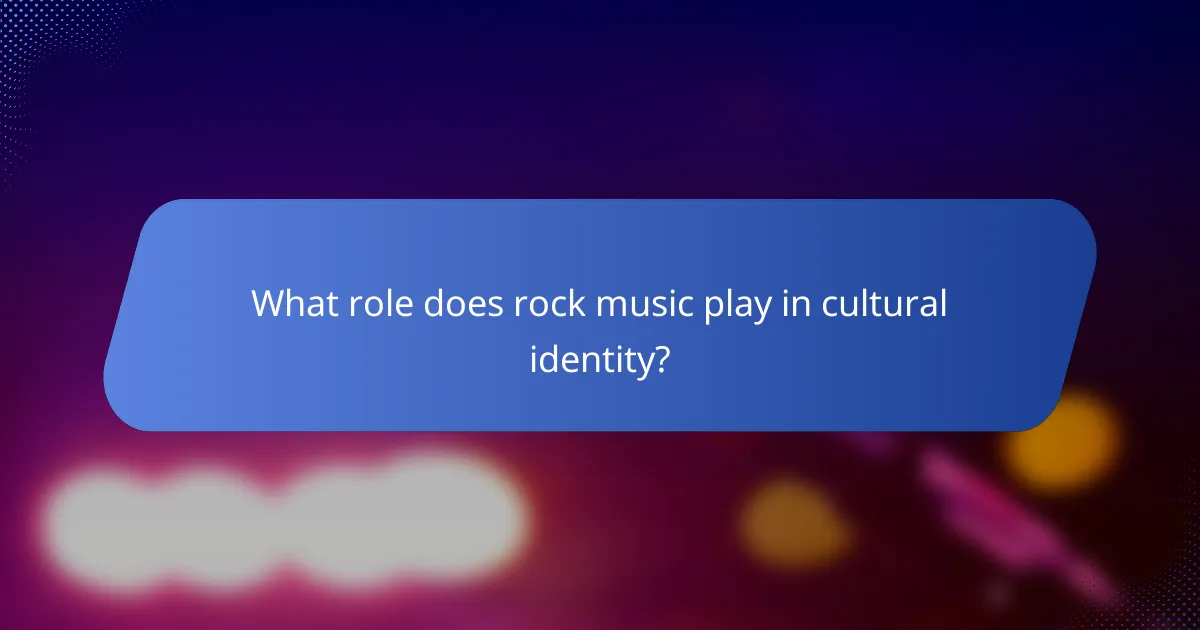
What role does rock music play in cultural identity?
Rock music serves as a powerful vehicle for cultural identity, allowing individuals and groups to express their values, beliefs, and experiences. It often reflects the social dynamics of its time, shaping and being shaped by the cultural landscape.
Formation of subcultures
Rock music has historically been a catalyst for the formation of diverse subcultures, each with its own distinct identity and values. From punk to grunge, these movements often arise in response to societal issues, providing a sense of belonging and community among like-minded individuals.
These subcultures frequently adopt specific fashion styles, language, and attitudes that reflect their musical influences, creating a rich tapestry of cultural expression. For example, the punk movement of the late 1970s emphasized anti-establishment sentiments and DIY ethics, which resonated with youth disillusioned by mainstream society.
Connection to Australian heritage
In Australia, rock music is deeply intertwined with the nation’s cultural heritage, reflecting its diverse influences and history. Indigenous Australian rock artists have incorporated traditional elements into their music, bridging contemporary sounds with ancient stories and cultural practices.
This connection fosters a sense of pride and identity among Australians, as rock music often addresses local issues and celebrates the unique landscape and experiences of the country. Festivals and events showcasing Australian rock music serve as platforms for cultural expression and community engagement.
Influence of iconic Australian bands
Iconic Australian bands like AC/DC, INXS, and Midnight Oil have significantly shaped the rock music scene, influencing both local and global audiences. Their music often addresses themes relevant to Australian identity, such as social justice, environmental issues, and national pride.
These bands have not only achieved commercial success but have also become symbols of Australian culture, inspiring new generations of musicians. Their legacy continues to impact the rock genre, encouraging a blend of styles that resonate with the evolving cultural identity of Australia.
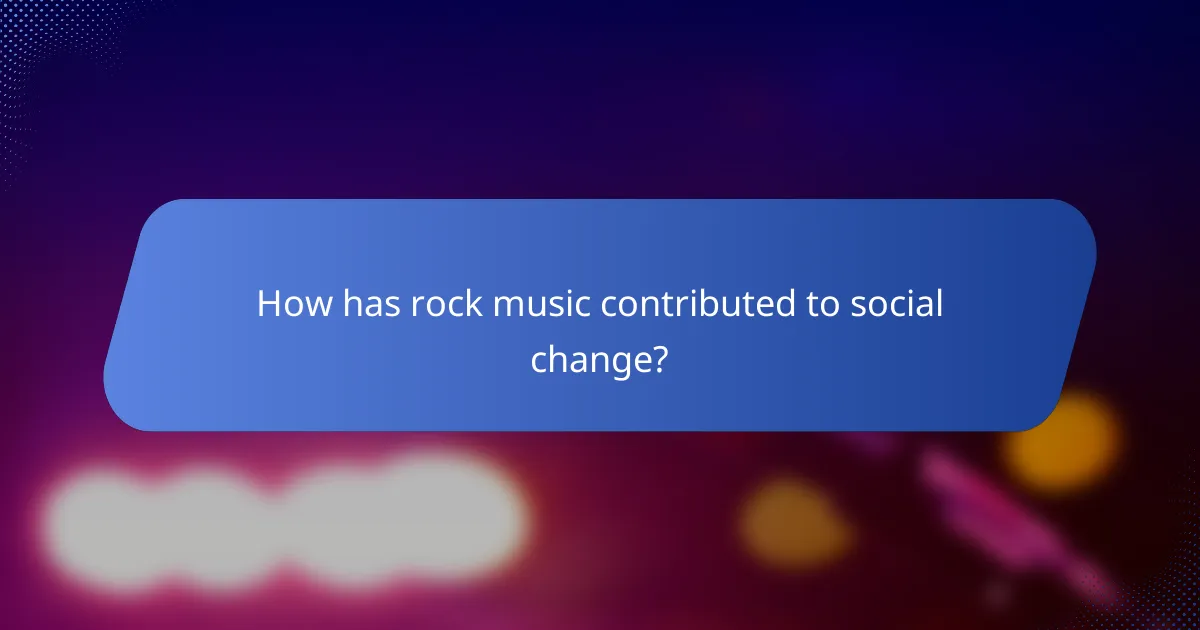
How has rock music contributed to social change?
Rock music has played a significant role in driving social change by amplifying voices advocating for various social issues and inspiring political movements. Through its powerful lyrics and rebellious spirit, rock has become a vehicle for expressing dissent and promoting awareness on critical societal topics.
Advocacy for social issues
Rock music often addresses pressing social issues such as civil rights, gender equality, and environmental concerns. Artists use their platforms to raise awareness and inspire action, making music a form of advocacy. For instance, songs that highlight the struggles of marginalized communities can mobilize listeners to engage in activism.
Many rock musicians actively participate in campaigns and benefit concerts, further demonstrating their commitment to social causes. This engagement not only raises funds but also educates fans about the issues at hand, fostering a sense of community and shared purpose.
Impact on political movements
Rock music has been a catalyst for political movements, often serving as a soundtrack to protests and rallies. During the 1960s and 1970s, for example, rock anthems became synonymous with the anti-war movement and the fight for civil rights. The genre’s rebellious nature resonated with youth, encouraging them to challenge the status quo.
In more recent times, rock artists have continued to influence political discourse, using their music to comment on issues like government corruption and social injustice. Their ability to reach a wide audience makes rock a powerful tool for political engagement and change.
Examples of protest songs
Numerous rock songs have become iconic protest anthems, encapsulating the spirit of resistance. Tracks like “Fortunate Son” by Creedence Clearwater Revival and “Killing in the Name” by Rage Against the Machine exemplify how rock can articulate dissent against war and systemic oppression.
These songs not only resonate with listeners but also inspire collective action. By highlighting injustices and calling for change, protest songs have the potential to unite people around a common cause, making them a vital part of the social change narrative in rock music.

What are the key characteristics of Australian rock music?
Australian rock music is characterized by its diverse sound, strong local influences, and a vibrant festival culture. It often blends elements from various genres while reflecting the unique cultural identity of Australia.
Distinctive sound and style
The distinctive sound of Australian rock music often features powerful guitar riffs, emotive lyrics, and a blend of melodic and rhythmic elements. Bands like AC/DC and Midnight Oil exemplify this style, combining hard rock with socially conscious themes.
Vocals in Australian rock can range from gritty and raw to polished and melodic, often showcasing a distinctly Australian accent. This authenticity resonates with local audiences while appealing to international listeners.
Influence of local genres
Local genres such as pub rock and alternative rock have significantly shaped Australian rock music. Pub rock, which emerged in the 1970s, emphasizes live performance and a communal atmosphere, influencing bands like Cold Chisel and The Angels.
Additionally, the incorporation of Indigenous music elements and folk influences has enriched the rock scene, creating a unique sound that reflects the country’s cultural diversity. This blending of styles enhances the authenticity and relatability of the music.
Notable Australian rock festivals
Australia hosts several renowned rock festivals that celebrate its vibrant music scene. Events like the Big Day Out and Splendour in the Grass attract both local and international acts, showcasing a wide array of rock music styles.
These festivals not only provide a platform for established artists but also promote emerging talent, fostering a sense of community among fans. Attendees can expect a mix of performances, art installations, and food vendors, creating a festive atmosphere that highlights the cultural significance of rock music in Australia.
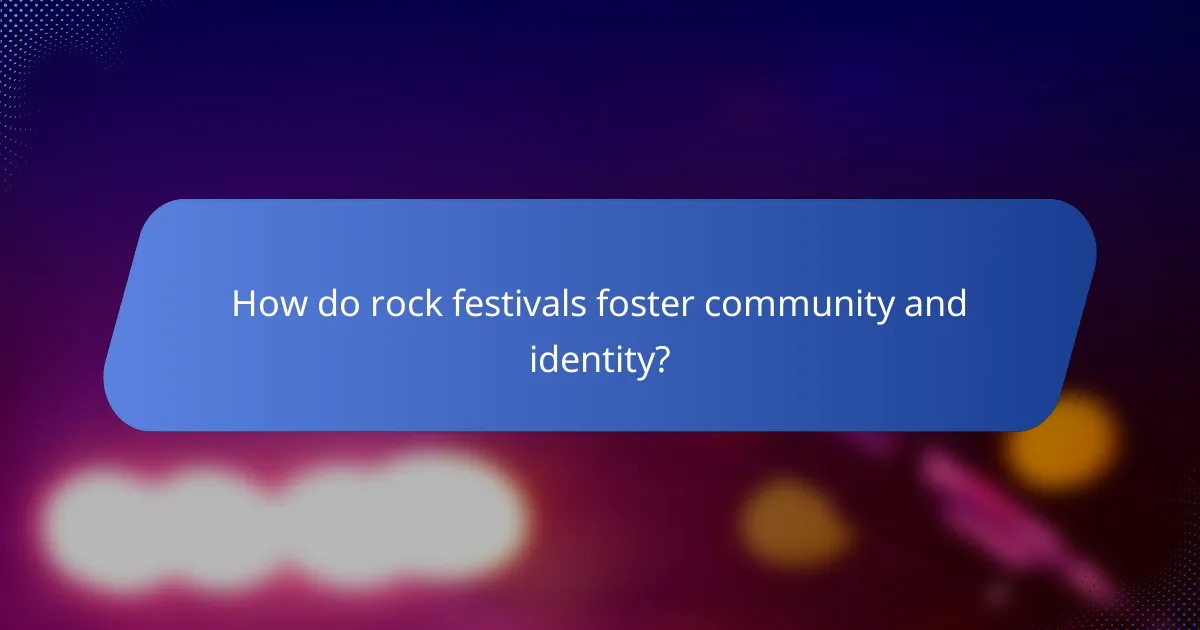
How do rock festivals foster community and identity?
Rock festivals create a unique environment where individuals come together, fostering a sense of community and shared identity. By celebrating music and culture, these events encourage connections among diverse groups of people, enhancing social bonds and cultural expression.
Gathering diverse audiences
Rock festivals attract a wide range of attendees, including different age groups, backgrounds, and cultures. This diversity enriches the festival experience, allowing for the exchange of ideas and perspectives. For instance, a festival in Europe may see attendees from various countries, each bringing their own cultural influences.
Such gatherings often lead to new friendships and collaborations, as people bond over shared musical interests. The collective atmosphere encourages openness and acceptance, making it a melting pot of identities.
Celebration of local talent
Rock festivals often feature local bands and artists, providing them with a platform to showcase their talent. This not only boosts the local music scene but also fosters pride among community members. Attendees are more likely to support local acts, creating a cycle of encouragement and growth.
For example, festivals in the United States frequently highlight regional musicians, giving them exposure to larger audiences. This celebration of local talent helps to solidify cultural identity and promotes a sense of ownership within the community.
Building a sense of belonging
Attending a rock festival can instill a profound sense of belonging among participants. The shared experience of enjoying live music creates lasting memories and connections. Many attendees return year after year, forming a community that extends beyond the festival itself.
Moreover, the festival environment often encourages inclusivity, where individuals feel accepted regardless of their background. This sense of belonging can be particularly powerful for youth, as they navigate their identities and seek connections with others who share similar passions.
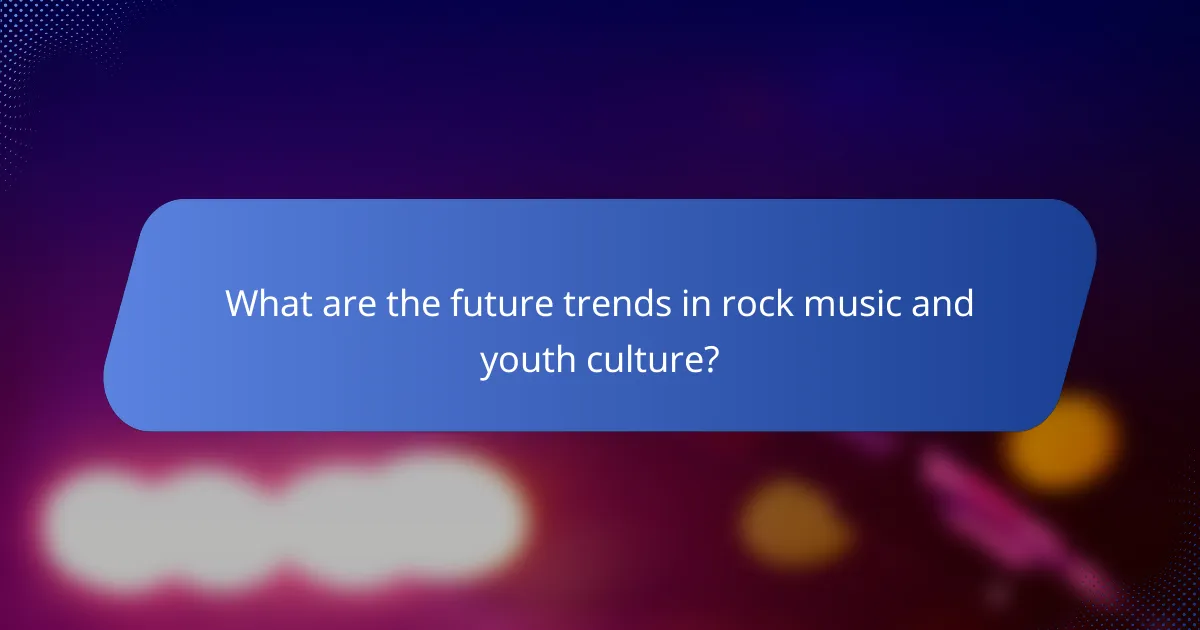
What are the future trends in rock music and youth culture?
Future trends in rock music and youth culture are increasingly shaped by technological advancements and shifting social dynamics. As digital platforms evolve, they create new avenues for artists and fans to connect, influencing how music is produced, distributed, and consumed.
Integration of digital platforms
The integration of digital platforms is revolutionizing how rock music reaches audiences. Streaming services, social media, and music-sharing apps allow artists to distribute their work globally, often bypassing traditional record labels. This democratization of music distribution enables independent musicians to gain visibility and build fan bases without significant financial backing.
Platforms like Spotify, YouTube, and TikTok have become essential tools for marketing and engagement. Artists can share snippets of their music, connect with fans through live streams, and even collaborate with other musicians across the globe. This trend emphasizes the importance of a strong online presence for both emerging and established rock artists.
However, navigating these digital platforms requires strategic thinking. Artists should focus on creating engaging content that resonates with their audience while also considering the algorithms that govern visibility on these platforms. Regular interaction with fans and consistent content updates can significantly enhance an artist’s reach and impact in the rock music scene.
